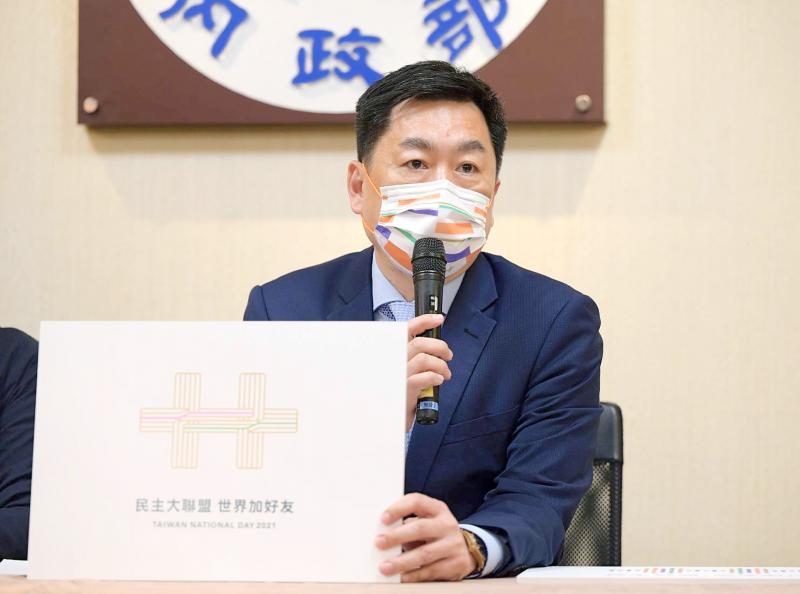Regulations on applications for entry to the nation by foreign spouses or minor children of Taiwanese have been relaxed effective immediately, the Central Epidemic Command Center (CECC) said yesterday, as it reported two new local and three imported cases of COVID-19.
Deputy Minister of the Interior Chen Tsung-yen (陳宗彥), deputy head of the center, said the relaxation meant that such applications would be treated as general cases, instead of special ones that are reviewed on a case-by-case basis.
“Considering the recent local COVID-19 situation and the needs of foreign spouses and children to visit their family in Taiwan, we are allowing Taiwan’s overseas representative offices to approve such applications as general cases,” Chen said.

Photo courtesy of the Ministry of the Interior
“The policy also includes spouses and minor children from China, Hong Kong and Macau,” he added.
When a nationwide level 3 COVID-19 alert was issued on May 19, foreign nationals without a valid residence permit were temporarily banned from entering Taiwan.
They were only allowed to apply for a special entry visa after being granted special permission by the CECC for emergencies or on humanitarian grounds.
Under the new policy, foreign spouses or minor children of Taiwanese can directly apply for a dependent visa or a family visit visa at Taiwan’s representative offices, and receive a special entry permit visa, the CECC said.
Dependent visas that were due to expire between May 19 and yesterday would be automatically extended until Dec. 31, it said.
Reporting on the latest domestic COVID-19 cases, Minister of Health and Welfare Chen Shih-chung (陳時中), who heads the center, said that one of the local cases is a woman in her 50s who lives in Taoyuan and is the wife of a previously confirmed case, who is linked to the preschool cluster of infections in New Taipei City’s Banciao District (板橋).
The other case is a woman in her 60s who lives in New Taipei City and is the grandmother of a confirmed case — a student at a junior high school in Taipei’s Songshan District (松山), who was infected with the Alpha variant of SARS-CoV-2, Chen said.
Centers for Disease Control Deputy Director-General Philip Lo (羅一鈞), deputy head of the CECC’s medical response division, said that genome sequencing of a virus sample from another case in the preschool cluster showed that the person was infected with the Delta variant of SARS-CoV-2.
However, genome sequencing of the virus samples from two other cases associated with the cluster — a foreign national who is the father of a preschool student and an anesthetist who lives in the same building — failed to identify the virus strain, as the viral loads of the two cases were too low, he said.
So far, 21 cases associated with the preschool cluster have been confirmed as being infected with the Delta variant, CECC data showed.
The CECC also reported three imported cases from Japan and the US, and no COVID-19 deaths.

CHAOS: Iranians took to the streets playing celebratory music after reports of Khamenei’s death on Saturday, while mourners also gathered in Tehran yesterday Iranian Supreme Leader Ayatollah Ali Khamenei was killed in a major attack on Iran launched by Israel and the US, throwing the future of the Islamic republic into doubt and raising the risk of regional instability. Iranian state television and the state-run IRNA news agency announced the 86-year-old’s death early yesterday. US President Donald Trump said it gave Iranians their “greatest chance” to “take back” their country. The announcements came after a joint US and Israeli aerial bombardment that targeted Iranian military and governmental sites. Trump said the “heavy and pinpoint bombing” would continue through the week or as long

TRUST: The KMT said it respected the US’ timing and considerations, and hoped it would continue to honor its commitments to helping Taiwan bolster its defenses and deterrence US President Donald Trump is delaying a multibillion-dollar arms sale to Taiwan to ensure his visit to Beijing is successful, a New York Times report said. The weapons sales package has stalled in the US Department of State, the report said, citing US officials it did not identify. The White House has told agencies not to push forward ahead of Trump’s meeting with Chinese President Xi Jinping (習近平), it said. The two last month held a phone call to discuss trade and geopolitical flashpoints ahead of the summit. Xi raised the Taiwan issue and urged the US to handle arms sales to

BIG SPENDERS: Foreign investors bought the most Taiwan equities since 2005, signaling confidence that an AI boom would continue to benefit chipmakers Taiwan Semiconductor Manufacturing Co’s (TSMC, 台積電) market capitalization swelled to US$2 trillion for the first time following a 4.25 percent rally in its American depositary receipts (ADR) overnight, putting the world’s biggest contract chipmaker sixth on the list of the world’s biggest companies by market capitalization, just behind Amazon.com Inc. The site CompaniesMarketcap.com ranked TSMC ahead of Saudi Aramco and Meta Platforms Inc. The Taiwanese company’s ADRs on Tuesday surged to US$385.75 on the New York Stock Exchange, as strong demand for artificial intelligence (AI) applications led to chip supply constraints and boost revenue growth to record-breaking levels. Each TSMC ADR represents

State-run CPC Corp, Taiwan (CPC, 台灣中油) yesterday said that it had confirmed on Saturday night with its liquefied natural gas (LNG) and crude oil suppliers that shipments are proceeding as scheduled and that domestic supplies remain unaffected. The CPC yesterday announced the gasoline and diesel prices will rise by NT$0.2 and NT$0.4 per liter, respectively, starting Monday, citing Middle East tensions and blizzards in the eastern United States. CPC also iterated it has been reducing the proportion of crude oil imports from the Middle East and diversifying its supply sources in the past few years in response to geopolitical risks, expanding